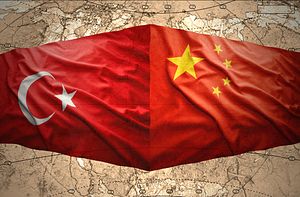Turkey’s president, Recep Tayyip Erdogan, arrived in China today and held meetings with Chinese officials, including Premier Li Keqiang and President Xi Jinping. It’s his first visit to China since assuming the presidency in August 2014, although he traveled to Beijing in 2012 while serving as prime minister.
As I noted previously, the trip faced an unwelcome complication thanks to issues related to ethnic Uyghurs in China. Anti-China protests broke out in Turkey earlier this month over reports that Uyghur celebrations of Ramadan were being restricted by the Chinese authorities. For its part, Beijing is angry that Turkish diplomats in Southeast Asia have reportedly been providing travel documents to Chinese Uyghurs, allowing them to more easily travel to Turkey. China is wary of Uyghurs seeking to carve out an independent state from China, and increasingly concerned about Uyghurs becoming radicalized and joining international terrorist groups.
In an oblique nod to those concerns, Erdogan assured Xi that Turkey opposes all forms of terrorism and also opposes any attempts to harm China’s sovereignty and territorial integrity, according to Xinhua. Erdogan also stressed that Turkey itself is a victim of terrorism. He promised that Turkey will not allow its cooperation with China to “be affected by ill-minded forces,” according to Xinhua’s paraphrasing. Before leaving for China, Erdogan accused unnamed forces of hyping the Uyghur issue to undermine his trip.
Also during their conversation, Xi and Erdogan promised to boost security and law enforcement cooperation between their two countries – but that’s easier said than done. Turkey faces steep opposition from the rest of NATO in moving closer to China on the security front, as evidenced by the way Turkey’s $3.4 billion missile defense system contract remains in a state of limbo over a year after Ankara first awarded the deal to a Chinese company.
Meanwhile, from China’s perspective, increased law enforcement cooperation will doubtless require more cooperation on stopping Uyghurs from traveling to Turkey. China calls such migrants illegal immigrants (or worse, terrorists) while Turkey sees them as refugees. Public sentiment in Ankara will block any real cooperation on this front, however, as evidenced by angry protests against Thailand for its repatriation over nearly 100 Uyghurs.
Still, China sees room for cooperation on anti-terrorism activities, and has been heavily emphasizing Turkey’s increased efforts against Islamic State in its state media outlets. Fighting against Islamic State provides ample common ground between Beijing and Ankara.
Also, though Turkey is extremely sensitive to Chinese treatment of Uyghurs, there are vague parallels to Turkey’s own stance toward to Kurds. In both bases, the governments are intensely concerned about separatist sentiments among an ethnic minority group – and both China and Turkey have had to deal with terrorists from those ethnic groups seeking to gain their objectives by force. With the old conflict with Kurdish groups heating up in Turkey, Beijing may find Ankara a bit more receptive to its normal complaints about Uyghur separatists.
Meanwhile, in the meeting between Erdogan and Li, the two sides sought to move past security issues to deepen their economic relationship. As Altay Atli, a lecturer at the Asian Studies program of Boğaziçi University in Istanbul, noted in an article for Asia Times, Turkey’s involvement in China’s Silk Road Economic Belt was high on Erdogan’s agenda. Atli explained that Turkey is extremely interested in the project, for two major reasons: bringing in more Chinese investment, and cementing Turkey’s place as a hub connecting Asia and Europe.
Talking with Li, who is generally responsible for economic matters, Erdogan said he “welcomed China’s expanded investment and cooperation with Turkey in areas including infrastructure building, energy, communication, finance, aviation and project contracting.” He also told Li that “Turkey expects to become a manufacturing and logistics base for Chinese enterprises.” In return, Li assured Erodgan that Turkey will reap the benefits of China’s “Belt and Road.”

































